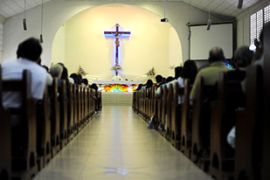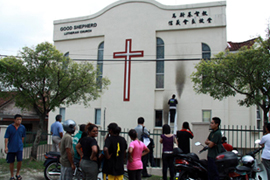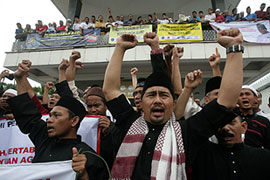Malaysia vows to protect diversity
Government pledges commitment to religious diversity as another church is attacked.

The unprecedented attacks which started in the capital, Kuala Lumpur, early on Friday had since spread to several other states on the peninsula, setting off a wave of disquiet among minority Christians in the Muslim majority country.
Latest attack
In the latest attack early on Monday, the main entrance of the Sidang Injil Borneo Church in the southern state of Negeri Sembilan was left charred, a church official said, adding that however there was no evidence that it was fire-bombed.
“I immediately rushed here to check, it was very smoky inside the building but we are lucky that the fire didn’t spread,” senior pastor Eddy Marson Yasir said.
The evangelical church caters mostly to Christians from eastern Sabah and Sarawak states, who worship in the Malay language and use the word “Allah” to describe God.
Speaking to reporters, Mahmood Adam, the ministry’s secretary-general, said the diplomats wanted to know why “Allah” was off-limits in Malaysia when it is widely used by Christians in Indonesia and the Middle East.
‘Fair comparison’
“Be fair, you have to compare apples to apples, oranges to oranges. Our landscape is different from other countries,” he said.
“Malays here are different from other countries. The landscape here is different from Indonesia so we can’t compare.”
|
“There has been a gradual merging of Malay identity with Islam. Minorities are under siege and feel they don’t have a place in Malaysia anymore” James Chin, political scientist, Monash University in Malaysia |
Analysts say the line between race and religion in the country was eroding as Umno, the main partner in the ruling Barisan Nasional coalition, pursues racial issues more intensely to shore up support.
“There has been a gradual merging of Malay identity with Islam. Malaysia is heading toward dangerous waters,” said James Chin, a political science lecturer at Monash University in Malaysia.
“Minorities are under siege and feel they don’t have a place in Malaysia anymore.”
Earlier Najib Abdul Razak, the Malaysian prime minister, had condemned the attacks and vowed to do everything to bring the culprits to justice, reiterating that Umno, the party he leads, was not racist.
He said Umno had never had any intention to grab power from the country’s ethnic minorities and should not be blamed for the attacks.
“It’s been a difficult weekend for all. I share your outrage. We must stand united and not allow these incidents to break us,” read his most recent Twitter comment.
But Razaleigh Hamzah, a veteran Umno leader, criticised the party for “digging itself into an intolerant hard-line position” in a bid to woo voters after its election losses.
“Umno is fanning communal sentiment, and the government it leads is taking up policy lines based on sensitivities rather than principle,” he said on Monday.
Earlier attacks
On Sunday, a Molotov cocktail was hurled at the All Saints church in Taiping town in central Perak state early in the morning before it opened, said Zulkifli Abdullah, the state police chief.
He said police found burn marks on the wall but there was no damage to the building.
 |
| At least eight churches have been fire-bombed or vandalised since Friday [AFP] |
Nearby, a petrol bomb was thrown at a guard house of a Catholic convent school, but did not explode, police said.
Also in Taiping, which is about 300km from the capital, a broken kerosene bottle with an unlit wick was found early on Sunday inside the compound of the St Louis Catholic church, church officials and the police said.
In southern Malacca state, the outer wall of the Malacca Baptist church was splashed with black paint, police said.
And attackers hurled bricks and stones at glass windows of the Good Shepherd Catholic church in Miri – a major logging and oil town in East Malaysia’s Sarawak state, police and church officials said.
Four churches were hit by petrol bombs on Friday and Saturday, with the Metro Tabernacle church in the capital worst hit, the first level of its three-storey building gutted by fire.
No one has been hurt in the attacks so far and all the churches aside from Metro Tabernacle have suffered minor damage.
Police also received reports of cars displaying Christian symbols having their windscreens smashed in the capital on Saturday.
And police received a complaint on Saturday that a stone had been thrown at a glass door of a Muslim prayer room known as a surau, in the port town of Klang, said Khalid Abu Bakar, the police chief of Selangor state where three of the churches were attacked.
But he said rumours of attacks on a mosque were unfounded.
‘Allah’ controversy
A Malaysian court had on December 31 overturned a government ban on non-Muslims using the word “Allah” in their literature, allowing Roman Catholic weekly newsletter, the Herald, to use the term to refer to God in the Malay language.
 |
| Muslim groups protested the overturning of the “Allah” ban after Friday prayers [EPA] |
The ruling also applies to the ban’s broader applications such as Malay-language Bibles, 10,000 copies of which were recently seized by authorities because they translated God as Allah.
The judge has since suspended the implementation of the ruling, after the government appealed and the Roman Catholic church agreed to the suspension.
Muslim groups held protests after prayers on Friday against the court overturning the “Allah” ban.
Muslims in Malaysia argue that the “Allah” is exclusive to Islam, and its use by Christians would confuse Muslims.
But Catholic church officials say that for Christian indigenous tribes in East Malaysia, who are the main readers of the Herald’s Malay-language edition, “Allah” is the only word they have known for God for decades.
Despite the attacks and tensions, thousands of Malaysian Christians, which make up about nine per cent of Malaysia’s 26 million population, turned up for worship services on Sunday.
The Herald has been using Allah in its Bahasa Malaysia, the country’s national language, publication since 1995, but it was not until 2006 that it was warned by the government to stop using “Allah” to refer to God.